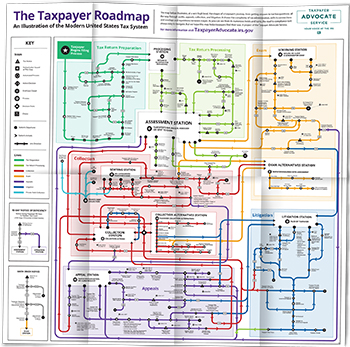Return of Levy Proceeds
View our interactive tax map to see where you are in the tax process. It could help you navigate your way through the IRS.
View our interactive tax map to see where you are in the tax process. It could help you navigate your way through the IRS.

You received correspondence from the IRS requesting payment for the tax balance owing and the debt remains unpaid. Since you have a balance owing, the IRS is continuing with its collection process by issuing a levy that can seize your property (such as funds from a bank account, Social Security benefits, wages, your car, or your home). However, in certain circumstances a levy can be released and/or levy proceeds returned.
This notice or letter may include additional topics that have not yet been covered here. Please check back frequently for updates.
You have an unpaid tax debt and the IRS has issued a levy, which is a legal seizure of your property or assets. It is different from a lien — while a lien makes a claim to your assets as security for a tax debt, the levy seizes your property (such as funds from a bank account, Social Security benefits, wages, your car, or your home). It also could mean that you have requested the IRS to return funds levied, and your request has been rejected. For specifics, see Levies and Publication 1660.
You have a balance on your tax account. A notice was sent to you previously letting you know how much you owe, when it was due, and how to pay. Since the IRS did not hear from you it is continuing with its collection process. The IRS can use a levy to satisfy a tax debt when you don’t respond to notices informing you of the debt and asking for payment.
The first thing to do is to check the return address to be sure it’s from the Internal Revenue Service and not another agency.
If the levy is from the IRS, and your property or federal payments are seized, call the number on your levy notice or 1-800-829-1040. If you’re already working with and IRS employee, call him or her for assistance. For specifics, see Levies.
If you’re in bankruptcy, the IRS may not be able to levy your assets. Contact the IRS and provide information about your bankruptcy chapter, the filing date, the court where you filed, and the case number.
Be prepared to propose an alternative way to pay your taxes if you’re asking the IRS to release a levy, which may include providing financial information for the IRS to review. If the IRS denies your levy release request, then you can appeal the decision. See Publication 1660 for a full explanation of Collection Due Process (CDP), the Equivalent Hearing process, and Collection Appeal Process (CAP).
Note: The IRS has Collection Financial Standards that help determine your ability to pay your taxes. Often, you’ll need to prepare a financial statement to establish economic hardship.
You must write and file a request to the IRS to return the levied property within two years from the date of the levy. Since levies on wages and Social Security benefits are ongoing, it is important to timely ask the IRS to return the proceeds based on when the levy started. See Publication 5149, Making an Administrative Return of Property Claim Under Internal Revenue Code (IRC) Section 6343(d); Publication 594, The IRS Collection Process; and Publication 1660.
If the IRS has already issued a CDP notice for that particular tax debt and you disagree with the IRS employee’s decision regarding any levy or seizure; you can still appeal the decision. You can do so by asking to have a conference with the employee’s manager. If you disagree with the manager’s decision, you may request the IRS Independent Office of Appeals (Appeals) review your case under the Collection Appeals Program as outlined in Publication 1660 within three business days of the meeting. You can request Appeals consideration in writing, verbally or via Form 9423, Collection Appeal Request.
You can also ask that the IRS manager review your case informally. You can obtain the manager’s name and phone number by contacting the employee listed on your notice. IRS employees are required to give you their manager’s name and phone number. For specifics, see Levies for further information.
If you need a tax professional to represent you, you can hire an attorney, certified public accountant (CPA), or enrolled agent (EA). If you need a tax professional but can’t afford one, you may be able to get help from a Low Income Tax Clinic (LITC).
If the tax being levied is the result of an audit where you didn’t know you were audited (never got a notice), you didn’t meaningfully participate, or you disagree with the findings, you may be able to ask for audit reconsideration.
If the tax being levied stems from the filing of a joint return and you believe your current or former spouse should be solely responsible for an incorrect item or an underpayment of tax on the return, you may be eligible for relief as an Innocent Spouse.

Understanding your notice or letter
For more specifics on your notice, visit Understanding your IRS Notice or Letter on IRS.gov
If you still need help
The Taxpayer Advocate Service is an independent organization within the IRS that helps taxpayers and protects taxpayers’ rights. We can offer you help if your tax problem is causing a financial difficulty, you’ve tried and been unable to resolve your issue with the IRS, or you believe an IRS system, process, or procedure just isn’t working as it should. If you qualify for our assistance, which is always free, we will do everything possible to help you.
Visit dev.taxpayeradvocate.irs.gov or call ![]() 1-877-777-4778.
1-877-777-4778.
Low Income Taxpayer Clinics (LITCs) are independent from the IRS and TAS. LITCs represent individuals whose income is below a certain level and who need to resolve tax problems with the IRS. LITCs can represent taxpayers in audits, appeals, and tax collection disputes before the IRS and in court. In addition, LITCs can provide information about taxpayer rights and responsibilities in different languages for individuals who speak English as a second language. Services are offered for free or a small fee. For more information or to find an LITC near you, see the LITC page on the TAS website or Publication 4134, Low Income Taxpayer Clinic List.
Related Notices and Letters
Return of Levy Process